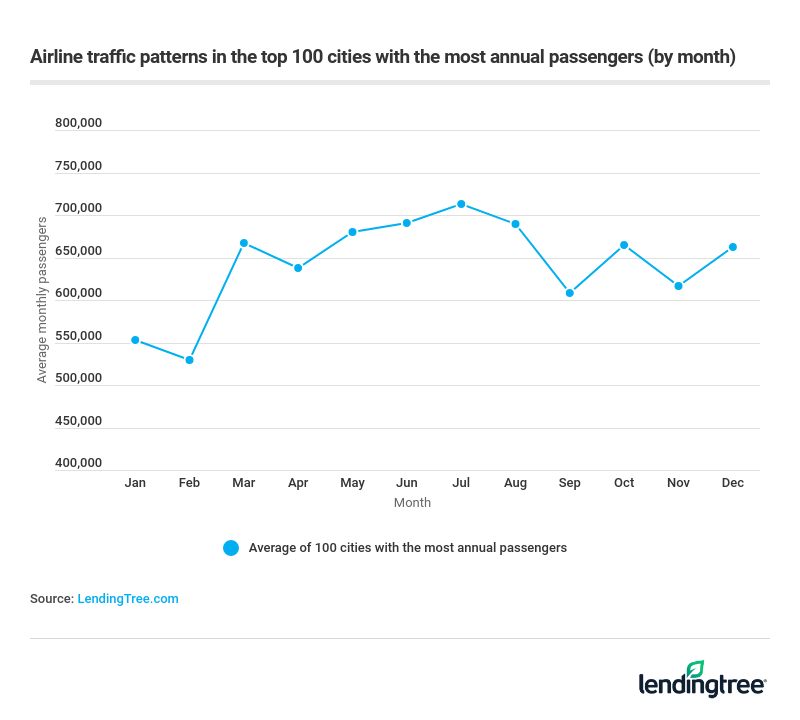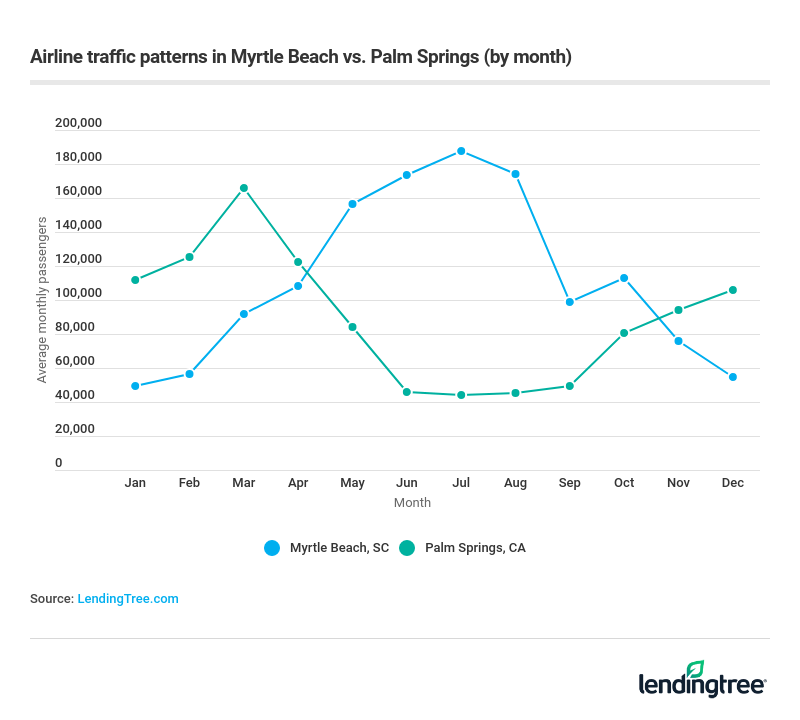Cities With Tourism Industries Most Vulnerable to a COVID-19 Summer Slowdown
The coronavirus pandemic has upended the travel industry worldwide, and it’s unclear when travel and tourism will get back to normal. The consequences of a travel slowdown this summer will be felt harder in some cities, especially America’s most popular summer destinations that rely on crowds of tourists to pump money into the local economy.
To determine which travel destinations would be most affected by a summer slowdown caused by the COVID-19 crisis, the LendingTree data team analyzed the airline traffic patterns during the summer months (designated as June, July and August for the purpose of this study) of the top 100 destinations with the most annual passengers. We then ranked which cities would be most affected by the pandemic based on the amount of travel a city received during the summer months as the pandemic continues to disrupt travel plans versus the non-summer months.
Key findings
- Summer is the season of travel for Americans, and with no end to the coronavirus pandemic in sight, the travel industry is poised to take a blow. Of the 100 cities we analyzed, 89 destinations see more airline passenger traffic in the summer months than in the non-summer months.
- Myrtle Beach, S.C. sees the largest increase in travelers in the summer months and will suffer this summer if the COVID-19 crisis continues to upend travel plans. Air traffic nearly doubles (99.3%) over the summer, with an average of about 89,400 passengers during the destination’s low season and more than 178,000 during the busy season.
- Coming in second is Anchorage, Alaska, where summer airline traffic is about 82% higher than non-summer months. For people who love nature and the great outdoors, summer is the ideal season to visit Alaska and its largest city.
- Portland, Maine, takes third place with an airport traffic increase by 45% in summer. Like Anchorage, Alaska, the climate is harsh in the non-summer months. Once the milder weather hits, Portland’s tourism industry typically picks up.
- Palm Springs, Calif., will likely be the least affected by the pandemic-related shutdowns this summer, as travel to the area decreases in June, July and August. Overall, this city saw 57% less travel in summer than during the non-summer months.
- Fort Myers, Fla., is another destination that is more popular in the non-summer months. Airline traffic here is 41% lower in the summer than in non-summer months, the second-biggest decline in percentage difference between summer and non-summer travelers.
- West Palm Beach, Fla., sees about 22% fewer summer passengers than non-summer passengers. Again, with typically less airline traffic in the summer months, it’s hard to say whether the coronavirus pandemic will take a toll on this area in summer 2020.
Summer travel destinations that risk losing visitors due to the COVID-19 crisis
In regions all across America, summer vacation hot spots will face economic hardship due to stay-at-home orders put in place to help stop the spread of the coronavirus outbreak. East coast beach towns, tropical island destinations and quaint northern towns alike can be found at the top of our list, which means they’re particularly vulnerable to a summer vacation slowdown caused by the coronavirus pandemic.
No. 1 destination Myrtle Beach eclipses all other cities on our list, as it sees nearly twice (99.3%) the airline traffic in the busy summer months as it does the rest of the year. The No. 2 spot is Anchorage, Alaska, which sees 82.2% more airline traffic in summer months than it does during the winter. Coming in at No. 3 is Portland, Maine, which sees 44.9% more airline traffic in the summer months than the non-summer months.
Hawaiian cities are also positioned to take a big hit due to COVID-19 restrictions. Four destinations in the Aloha State ranked in the top 25 of our list: Kona (No. 5), Kahului (No. 8), Lihue (No. 18) and Honolulu (No. 25). Travelers have some other hurdles to jump if they plan to vacation in Hawaii this summer, as Gov. David Ige has imposed a mandatory two-week “self-quarantine” for all visitors coming to the island through June 30, making a Hawaiian getaway all but impossible for visitors from the continental U.S.
In many top summer destinations, tourism is integral to the local economy
For the people who live and work in areas that rely on the summer tourism industry, the time between Memorial Day weekend and Labor Day weekend is considered high season. It’s when many hospitality industry workers earn the bulk of their income for the year so they can stay afloat during the low season. This year, workers in tourism-fueled industries may not be able to rely on millions of visitors pumping money into the local economy due to restrictions put in place to stop the spread of the coronavirus outbreak.
For instance, the tourism industry in our study’s No. 1 destination Myrtle Beach generated $10.8 billion in 2018, fueled by a record 20.4 million visitors to the area. Without the waves of seasonal visitors, hospitality and tourism industry businesses like restaurants, bars and hotels, will suffer by loss of revenue.
Destinations with peak travel in the summer are hit the hardest
June, July and August are peak travel months in the cities that we analyzed in the study, meaning that a summer slowdown caused by the coronavirus pandemic will do a lot of damage to the travel industry as a whole.

Of course, vacation destinations with unique climates will have different peak travel seasons. While snowbirds escape the dreary winters of the Northeast to soak up some rays in the Sunshine State, tourists may escape to Alaska when the summer heat becomes intolerable in their own hometown. Or when the rain and cold become too much to bear during a Pacific Northwest winter, travelers flock to sunny destinations like Arizona before the summer temperatures catapult into the triple digits.
Take Myrtle Beach, S.C. and Palm Springs, Calif. for example. Families with children and young vacationers looking to escape the monotony of summer break may want to spend a week in the sun or on the green at Myrtle Beach. The self-proclaimed “Golf Capital of the World” sees the largest uptick in summer travel, according to our data. But in Palm Springs, the high temperatures in June, July and August average in the triple digits, making this California city a less-than-ideal place to visit in the summer months. You can see the stark difference in airline traffic in the chart below.

It’s unclear what effect the coronavirus pandemic will have on cities such as Palm Springs that have peak travel during other months. While the summer months will almost certainly be affected by the virus, it’s possible that the tourism industry will continue to suffer into this fall, winter and even spring of 2021.
Travel destinations that will be least affected by a summer slowdown
Rounding out the bottom of our list are cities that see less air traffic during the summer months than they do during the non-summer months:
- Palm Springs, Calif.: -56.6%
- Fort Myers, Fla.: -40.7%
- West Palm Beach, Fla.: -21.8%
- Sarasota, Fla.: -14.0%
- Tucson, Ariz.: -13.0%
- Punta Gorda, Fla.: -11.3%
- Fort Lauderdale, Fla.: -6.5%
- Miami: -5.8%
- Tampa, Fla.: -5.4%
- New Orleans: -3.6%
- Phoenix: -1.9%
Seven out of the 11 cities that see less airline traffic in the summer months are in Florida, meaning that the Sunshine State could potentially see a smaller impact on the tourism industry due to the COVID-19 crisis than other vacation destinations across America.
Vacationing amidst the coronavirus pandemic: What to know
The year 2020 has been unpredictable thus far, and that probably won’t change anytime soon. Summer travel plans that were booked months or years in advance are now in limbo, although more than half of Americans have already delayed their upcoming vacations due to coronavirus fears, according to a ValuePenguin survey.
Another indicator that Americans plan to vacation less this summer is the decreased interest in loans that may be used to cover vacation expenses. Interest in vacation and wedding loans dropped by 76% between Jan. 5 and May 10, 2020 according to LendingTree personal loan inquiry data.
However, some Americans are moving forward with travel plans this summer. People who are eager to get out of their homes but still want to practice safe social distancing practices may choose road trip destinations to avoid the close proximity to strangers that comes with flying. There’s even been a spike in summer RV rentals, according to RVshare, a peer-to-peer RV rental marketplace.
But the coronavirus pandemic will make it all but impossible to enjoy the social activities that were once synonymous with traveling ー attending live events, grabbing a pint at local pubs and dining out at cozy restaurants.
Most importantly, there are still reports of COVID-19 cases in every state, and the Centers for Disease Control recommends that tourists do the proper research necessary to ensure a safe journey, emphasizing that “travel increases your chances of getting and spreading COVID-19.” As of May 19, the CDC still recommends against all nonessential travel.
As some states begin to reopen, others extend stay-at-home orders
Since the coronavirus pandemic is affecting different regions of the country in different ways, it’s impossible to definitively advise that all Americans should either cancel or keep their summer vacation plans.
A few states, including Delaware and Illinois, have stay-at-home orders through the end of May. Virginia and the District of Columbia have the longest stay-at-home orders, which will be in effect until June 10 and June 8, respectively. Before booking or going through with your summer travel plans, be sure to check the CDC website for guidance, as well as any local Chamber of Commerce websites that will have guidance on municipal regulations.
Even if the area to which you are traveling has lifted stay-at-home regulations, that doesn’t necessarily make it safe for you to travel from your home state (or through other states).
If your finances have been impacted by the coronavirus pandemic, visit www.lendingtree.com/coronavirus for resources, tips and information about how to manage your money during this time.
Methodology
In order to rank the cities most vulnerable to a summer slowdown in airline traffic, we first took a list of the 100 cities with the most annual passengers arriving to local airports. We then compared the average monthly passengers during summer months, which we designated as June, July and August, and compared it to the average monthly passengers in the other nine months. We ranked the states from highest to lowest based on the largest percent change from non-summer to summer. Data comes from the Bureau of Transportation Statistics and is for 2019.
Get personal loan offers from up to 5 lenders in minutes
